This article was medically reviewed by Roy Nattiv, MD and by wikiHow staff writer, Eric McClure. Dr. Roy Nattiv is a Board-Certified Pediatric Gastroenterologist in Los Angeles, California. With over 20 years of experience he specializes in a broad range of pediatric gastrointestinal and nutritional illnesses such as constipation, diarrhea, reflux, food allergies, poor weight gain, SIBO, IBD, and IBS. He completed his pediatric residency at the Children’s Hospital at Montefiore, Albert Einstein College of Medicine in New York, and his fellowship at the University of California, San Francisco (UCSF). While at UCSF, he was a California Institute of Regenerative Medicine (CIRM) fellowship trainee and was awarded the North American Society for Pediatric Gastroenterology, Hepatology, and Nutrition (NASPGHAN) Fellow to Faculty Award in Pediatric IBD Research. Dr. Nattiv received his undergrad degree from the University of California, Berkeley, and his medical degree (MD) from the Sackler School of Medicine in Tel Aviv, Israel.
There are 27 references cited in this article, which can be found at the bottom of the page.
wikiHow marks an article as reader-approved once it receives enough positive feedback. This article received 12 testimonials and 100% of readers who voted found it helpful, earning it our reader-approved status.
This article has been viewed 655,588 times.
Acid reflux is the backflow of stomach acid into the esophagus, throat, or mouth. It can be unpleasant, but it helps to know that this is a fairly normal occurrence for most folks. It usually isn’t a big deal, but if you experience this regularly, you may have chronic acid reflux as a result of gastroesophageal reflux disease (GERD). If you suspect you have GERD, check in with a doctor to discuss potential solutions. GERD requires treatment, but it’s often extremely manageable with a few lifestyle changes and the occasional antacid![1]
Here are 12 effective ways to treat acid reflux.
Steps
Expert Q&A
Did you know you can get expert answers for this article?
Unlock expert answers by supporting wikiHow
-
QuestionWould almond milk be good because it doesn't have lactic acid?
 Sarah Gehrke, RN, MSSarah Gehrke is a Registered Nurse and Licensed Massage Therapist in Texas. Sarah has over 10 years of experience teaching and practicing phlebotomy and intravenous (IV) therapy using physical, psychological, and emotional support. She received her Massage Therapist License from the Amarillo Massage Therapy Institute in 2008 and a M.S. in Nursing from the University of Phoenix in 2013.
Sarah Gehrke, RN, MSSarah Gehrke is a Registered Nurse and Licensed Massage Therapist in Texas. Sarah has over 10 years of experience teaching and practicing phlebotomy and intravenous (IV) therapy using physical, psychological, and emotional support. She received her Massage Therapist License from the Amarillo Massage Therapy Institute in 2008 and a M.S. in Nursing from the University of Phoenix in 2013.
Registered Nurse
-
QuestionWill drinking apple cider help acid reflux?
 Sarah Gehrke, RN, MSSarah Gehrke is a Registered Nurse and Licensed Massage Therapist in Texas. Sarah has over 10 years of experience teaching and practicing phlebotomy and intravenous (IV) therapy using physical, psychological, and emotional support. She received her Massage Therapist License from the Amarillo Massage Therapy Institute in 2008 and a M.S. in Nursing from the University of Phoenix in 2013.
Sarah Gehrke, RN, MSSarah Gehrke is a Registered Nurse and Licensed Massage Therapist in Texas. Sarah has over 10 years of experience teaching and practicing phlebotomy and intravenous (IV) therapy using physical, psychological, and emotional support. She received her Massage Therapist License from the Amarillo Massage Therapy Institute in 2008 and a M.S. in Nursing from the University of Phoenix in 2013.
Registered Nurse
-
QuestionWhat foods should I avoid with acid reflux?
 Roy Nattiv, MDDr. Roy Nattiv is a Board-Certified Pediatric Gastroenterologist in Los Angeles, California. With over 20 years of experience he specializes in a broad range of pediatric gastrointestinal and nutritional illnesses such as constipation, diarrhea, reflux, food allergies, poor weight gain, SIBO, IBD, and IBS. He completed his pediatric residency at the Children’s Hospital at Montefiore, Albert Einstein College of Medicine in New York, and his fellowship at the University of California, San Francisco (UCSF). While at UCSF, he was a California Institute of Regenerative Medicine (CIRM) fellowship trainee and was awarded the North American Society for Pediatric Gastroenterology, Hepatology, and Nutrition (NASPGHAN) Fellow to Faculty Award in Pediatric IBD Research. Dr. Nattiv received his undergrad degree from the University of California, Berkeley, and his medical degree (MD) from the Sackler School of Medicine in Tel Aviv, Israel.
Roy Nattiv, MDDr. Roy Nattiv is a Board-Certified Pediatric Gastroenterologist in Los Angeles, California. With over 20 years of experience he specializes in a broad range of pediatric gastrointestinal and nutritional illnesses such as constipation, diarrhea, reflux, food allergies, poor weight gain, SIBO, IBD, and IBS. He completed his pediatric residency at the Children’s Hospital at Montefiore, Albert Einstein College of Medicine in New York, and his fellowship at the University of California, San Francisco (UCSF). While at UCSF, he was a California Institute of Regenerative Medicine (CIRM) fellowship trainee and was awarded the North American Society for Pediatric Gastroenterology, Hepatology, and Nutrition (NASPGHAN) Fellow to Faculty Award in Pediatric IBD Research. Dr. Nattiv received his undergrad degree from the University of California, Berkeley, and his medical degree (MD) from the Sackler School of Medicine in Tel Aviv, Israel.
Board Certified Gastroenterologist Avoid foods that are acidic, like oranges, lemons, orange juice, lemonade, and grapefuit; spicy foods like Fiery Hot Cheetos, Takis, salsa, Sriracha, Tapatio, and wasabi; and tomato-based foods like pizza, pizza sauce, spaghetti sauce, and marinara sauce. Also, stay away from greasy or fried foods, carbonated beverages, caffeine, and alcohol.
Avoid foods that are acidic, like oranges, lemons, orange juice, lemonade, and grapefuit; spicy foods like Fiery Hot Cheetos, Takis, salsa, Sriracha, Tapatio, and wasabi; and tomato-based foods like pizza, pizza sauce, spaghetti sauce, and marinara sauce. Also, stay away from greasy or fried foods, carbonated beverages, caffeine, and alcohol.
Warnings
- Untreated acid reflux aggravates high blood pressure.[41] It may also contribute to asthma attacks.[42]⧼thumbs_response⧽
- The regurgitation of stomach acid and undigested food during sleep may cause aspiration pneumonia and interfere with breathing.[43]⧼thumbs_response⧽
- Untreated acid reflux can lead to tissue damage that may result, in some cases, in bleeding ulcers or esophageal cancer.[44]⧼thumbs_response⧽
References
- ↑ https://www.mayoclinic.org/diseases-conditions/heartburn/expert-answers/heartburn-gerd/faq-20057894
- ↑ https://www.hopkinsmedicine.org/health/wellness-and-prevention/gerd-diet-foods-that-help-with-acid-reflux-heartburn
- ↑ Roy Nattiv, MD. Board Certified Gastroenterologist. Expert Interview. 13 January 2021.
- ↑ https://my.clevelandclinic.org/health/diseases/17019-gerd-or-acid-reflux-or-heartburn-overview
- ↑ Roy Nattiv, MD. Board Certified Gastroenterologist. Expert Interview. 13 January 2021.
- ↑ Roy Nattiv, MD. Board Certified Gastroenterologist. Expert Interview. 13 January 2021.
- ↑ Roy Nattiv, MD. Board Certified Gastroenterologist. Expert Interview. 13 January 2021.
- ↑ https://www.hopkinsmedicine.org/health/wellness-and-prevention/gerd-diet-foods-that-help-with-acid-reflux-heartburn
- ↑ https://www.hopkinsmedicine.org/health/wellness-and-prevention/gerd-diet-foods-that-help-with-acid-reflux-heartburn
- ↑ https://www.hopkinsmedicine.org/health/wellness-and-prevention/gerd-diet-foods-that-help-with-acid-reflux-heartburn
- ↑ https://www.hopkinsmedicine.org/health/wellness-and-prevention/gerd-diet-foods-that-help-with-acid-reflux-heartburn
- ↑ https://www.healthyfood.com/ask-the-experts/how-long-should-i-wait-before-eating-seconds/
- ↑ https://www.health.harvard.edu/digestive-health/9-ways-to-relieve-acid-reflux-without-medication
- ↑ https://www.ncbi.nlm.nih.gov/pmc/articles/PMC6702398/
- ↑ https://health.clevelandclinic.org/how-small-frequent-meals-can-help-athletes-keep-energy-high/
- ↑ https://www.health.harvard.edu/digestive-health/9-ways-to-relieve-acid-reflux-without-medication
- ↑ https://www.niddk.nih.gov/health-information/digestive-diseases/acid-reflux-ger-gerd-adults/treatment
- ↑ https://www.mayoclinic.org/diseases-conditions/heartburn/expert-answers/heartburn-gerd/faq-20057894
- ↑ https://health.clevelandclinic.org/a-doctors-advice-on-wearing-shapewear/
- ↑ https://www.niddk.nih.gov/health-information/digestive-diseases/acid-reflux-ger-gerd-adults/treatment
- ↑ https://www.ncbi.nlm.nih.gov/pmc/articles/PMC3801365/
- ↑ https://www.hopkinsmedicine.org/health/conditions-and-diseases/smoking-and-the-digestive-system
- ↑ https://www.ncbi.nlm.nih.gov/pmc/articles/PMC3801365/
- ↑ https://pubmed.ncbi.nlm.nih.gov/8179658/
- ↑ https://www.mayoclinic.org/diseases-conditions/gerd/diagnosis-treatment/drc-20361959
- ↑ https://www.mayoclinic.org/diseases-conditions/gerd/diagnosis-treatment/drc-20361959
- ↑ https://medlineplus.gov/ency/patientinstructions/000198.htm
- ↑ https://www.ncbi.nlm.nih.gov/pmc/articles/PMC7019778/
- ↑ https://www.ncbi.nlm.nih.gov/pmc/articles/PMC7019778/
- ↑ https://patient.info/digestive-health/indigestion-medication/h2-blockers
- ↑ https://medlineplus.gov/ency/patientinstructions/000382.htm
- ↑ https://patient.info/digestive-health/indigestion-medication/h2-blockers
- ↑ https://medlineplus.gov/ency/patientinstructions/000382.htm
- ↑ https://pubmed.ncbi.nlm.nih.gov/10871975/
- ↑ https://www.mayoclinic.org/drugs-supplements/omeprazole-oral-route/side-effects/drg-20066836?p=1
- ↑ https://healthblog.uofmhealth.org/digestive-health/what-to-do-if-ppis-arent-stopping-your-reflux-symptoms
- ↑ https://www.mayoclinic.org/diseases-conditions/gerd/symptoms-causes/syc-20361940
- ↑ https://www.mayoclinic.org/diseases-conditions/gerd/symptoms-causes/syc-20361940
- ↑ https://my.clevelandclinic.org/health/treatments/4354-laparoscopic-antireflux-surgery
- ↑ https://www.hopkinsmedicine.org/health/wellness-and-prevention/gerd-diet-foods-that-help-with-acid-reflux-heartburn
- ↑ https://www.ncbi.nlm.nih.gov/pubmed/28961574
- ↑ https://my.clevelandclinic.org/health/articles/10686-gerd-and-asthma
- ↑ https://www.uptodate.com/contents/acid-reflux-gastroesophageal-reflux-disease-in-adults-beyond-the-basics
- ↑ https://www.mayoclinic.org/diseases-conditions/barretts-esophagus/symptoms-causes/syc-20352841
About This Article
If you’re suffering from acid reflux, avoid foods which create an excess of stomach acid, such as chocolate, spicy or fried foods, garlic, or onions. Eating smaller, more frequent meals rather than a few big meals a day may also help to decrease your acid reflux. In addition, wait at least 3 hours after you eat before you lie down to give your body a chance to digest your food. These lifestyle changes, in combination with acid reflux medication or over-the-counter antacids, may help to give you relief from your symptoms. Keep reading for advice from our medical expert on how quitting smoking may help relieve your acid reflux!
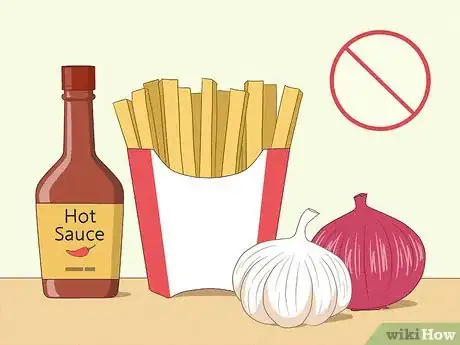

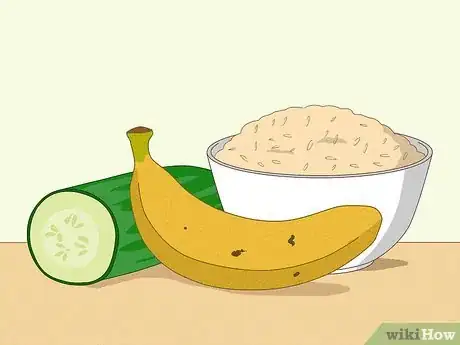
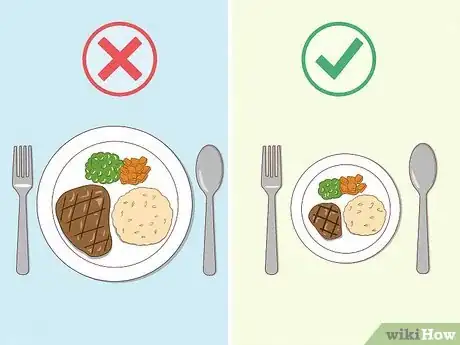
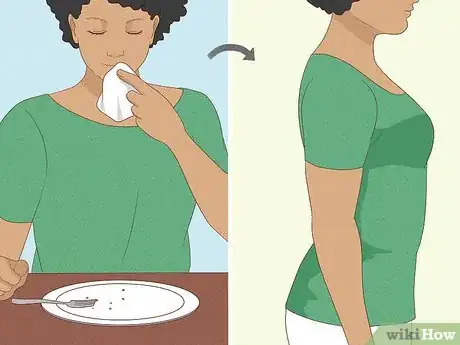


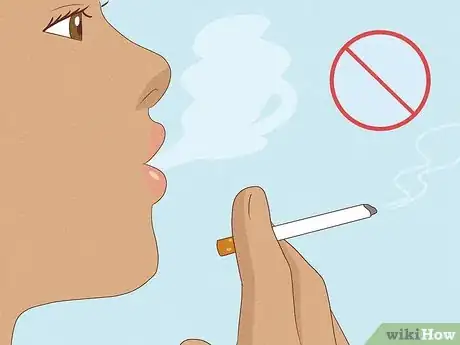
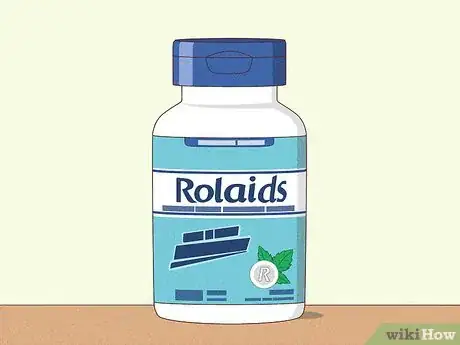
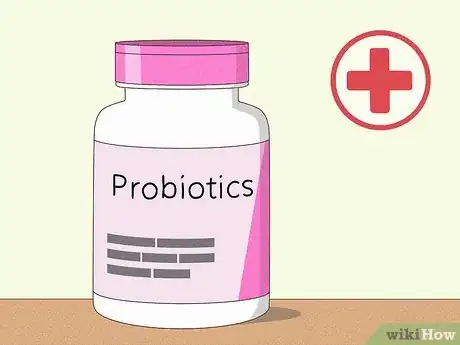

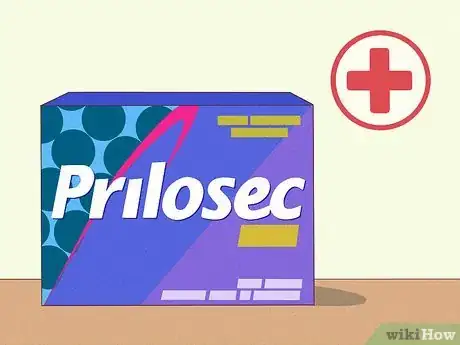
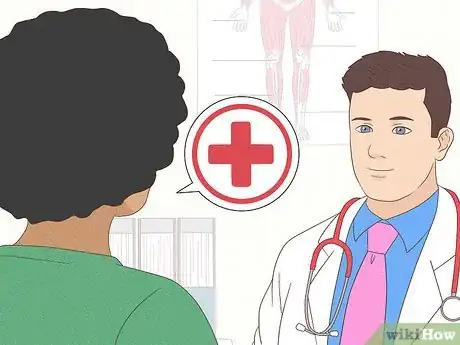


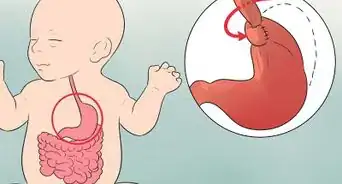

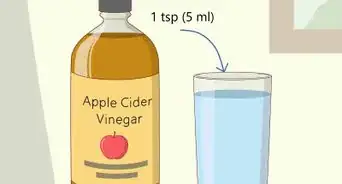



















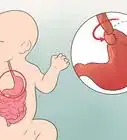




































Medical Disclaimer
The content of this article is not intended to be a substitute for professional medical advice, examination, diagnosis, or treatment. You should always contact your doctor or other qualified healthcare professional before starting, changing, or stopping any kind of health treatment.
Read More...